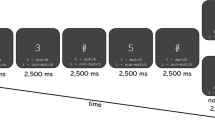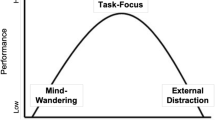Abstract
Background
Chronic low blood pressure (hypotension) is characterized by complaints such as fatigue, reduced drive, dizziness, and cold limbs. Additionally, deficits in attention and memory have been observed. Autonomic dysregulation is considered to be involved in the origin of this condition.
Purpose
The study explored autonomic cardiovascular control in the context of higher cognitive processing (executive function) in hypotension.
Methods
Hemodynamic recordings were performed in 40 hypotensive and 40 normotensive participants during execution of four classical executive function tasks (number-letter task, n-back task, continuous performance test, and flanker task). Parameters of cardiac sympathetic control, i.e., stroke volume, cardiac output, pre-ejection period, total peripheral resistance, and parasympathetic control, i.e., respiratory sinus arrhythmia and baroreflex sensitivity, were obtained.
Results
The hypotensive group exhibited lower stroke volume and cardiac output, as well as higher pre-ejection period and baroreflex sensitivity during task execution. Increased error rates in hypotensive individuals were observed in the n-back and flanker tasks. In the total sample, there were positive correlations of error rates with pre-ejection period, baroreflex sensitivity and respiratory sinus arrhythmia, and negative correlations with cardiac output.
Conclusions
Group differences in stroke volume, cardiac output, and pre-ejection period suggest diminished beta-adrenergic myocardial drive during executive function processing in hypotension, in addition to increased baroreflex function. Although further research is warranted to quantify the extent of executive function impairment in hypotension, the results from correlation analysis add evidence to the notion that higher sympathetic inotropic influences and reduced parasympathetic cardiac influences are accompanied by better cognitive performance.


Similar content being viewed by others
References
De Buyzere M, Clement DL, Duprez D. Chronic low blood pressure: a review. Cardiovasc Drug Ther. 1998; 12: 29–35.
Duschek S, Schandry R. Reduced brain perfusion and cognitive performance due to essential hypotension. Clin Auton Res. 2007; 17: 69–76.
Duschek S, Dietel A, Schandry R, Reyes del Paso GA. Increased sensitivity to heat pain in chronic low blood pressure. Eur J Pain. 2009; 13: 28–34.
Weisz N, Schandry R, Jacobs A, Mialet J, Duschek S. Early contingent negative variation of the EEG and attentional flexibility are reduced in hypotension. International J Psychophysiol. 2002; 45: 253–60.
Duschek S, Matthias E, Schandry R. Essential hypotension is accompanied by deficits in attention and working memory. Behav Med. 2005; 30: 149–158.
WHO. Arterial hypertension. Technical Report Series No. 628. Genova: World Health Organisation; 1978.
Covassin N, de Zambotti M, Cellini N, Sarlo M, Stegagno L. Cardiovascular down-regulation in essential hypotension: relationships with autonomic control and sleep. Psychophysiology. 2013; 50: 767–776.
Duschek S, Heiss H, Buechner B, Werner NS, Schandry R, Reyes del Paso GA. Hemodynamic determinants of chronic hypotension and their modification through vasopressor application. J Physiol Sci. 2009; 59: 105–112.
Covassin N, de Zambotti M, Cellini N, Sarlo M, Stegagno L. Nocturnal cardiovascular activity in essential hypotension: evidence of differential autonomic regulation. Psychosom Med. 2012; 74: 952–960.
de Zambotti M, Covassin N, Cellini N, Sarlo M, Torre J, Stegagno L. Hemodynamic and autonomic modifications during sleep stages in young hypotensive women. Biol Psychol. 2012; 91: 22–27.
Hassan S, Turner, P. Systolic time intervals: a review of the method in the non-invasive investigation of cardiac function in health, disease and clinical pharmacology. Postgrad Med J. 1983; 59: 423–434.
Malliani A, Pagani, M, Lombardi F, Cerutti S. Cardiovascular neural regulation explored in the frequency domain. Circulation. 1991; 84: 482–492.
Reyes del Paso GA, Langewitz W, Mulder LJM, van Roon A, Duschek S. The utility of low frequency heart rate variability as an index of sympathetic cardiac tone: a review with emphasis on a re-analysis of previous studies. Psychophysiology. 2013; 50: 477–487.
Berntson GG, Quigley KS, Lozano D. Cardiovascular psychophysiology. In: Cacioppo JT, Tassinary LG, Berntson GG, eds. Handbook of Psychophysiology. Cambridge: Cambridge University Press; 2007: 182–210.
Duschek S, Dietel A, Schandry R, Reyes del Paso GA. Increased baroreflex sensitivity and reduced cardiovascular reactivity in chronic low blood pressure. Hypertens Res. 2008; 31: 1873–1878.
Reyes del Paso GA, Langewitz W, Robles H, Perez N. A between-subjects comparison of respiratory sinus arrythmia and baroreceptor cardiac reflex sensitivity as non-invasive measures of tonic parasympathetic cardiac control. Int J Psychophysiol. 1996; 22: 163–171.
Levy MN, Pappano AJ. Cardiovascular Physiology. Philadelphia: Mosby Elsevier; 2007.
Stegagno L, Angrilli A, Costa M, Palomba D. Deficit cognitivi e ipotensione arteriosa: un´ indagine cronopsycofisiologica. Giornale Italiano di Psicologia. 1996; 23: 837–859.
Duschek S, Weisz N, Schandry R. Reduced cognitive performance and prolonged reaction time accompany moderate hypotension. Clin Auton Res. 2003; 3: 427–432.
Duschek S, Meinhardt J, Schandry R. Reduced cortical activity due to chronic low blood pressure: an EEG study. Biol Psychol. 2006; 72: 241–250.
Duschek S, Schandry R. Cognitive performance and cerebral blood flow in essential hypotension. Psychophysiology. 2004; 41: 905–913.
Costa M, Stegagno L, Schandry R, Bitti, PER. Contingent negative variation and cognitive performance in hypotension. Psychophysiology. 1998; 35: 737–744.
Duschek S, Schandry R. Deficient adjustment of cerebral blood flow to cognitive activity due to chronically low blood pressure. Biol Psychol. 2006; 72: 311–317.
Sarlo M, de Zambotti M, Gallicchio G, Devigili A, Stegagno L. Impaired cerebral and systemic hemodynamics under cognitive load in young hypotensives: a transcranial Doppler study. J Behav Med. 2013; 36: 134–142.
Miyake A, Friedman NP, Emerson MJ, Witzki AH, Howerter A, Wager TD. The unity and diversity of executive functions and their contributions to complex “frontal lobe” tasks: a latent variable analysis. Cognitive Psychol. 2000; 41: 49–100.
Zahn D, Adams J, Krohn J, Wenzel M, Mann CG, Gomille LK, Jacobi-Scherbening V, Kubiak T. Heart rate variability and self-control—a meta-analysis. Biol Psychol. 2016; 115: 9–26.
Duschek S, Muckenthaler M, Reyes del Paso GA. Relationships between features of cardiovascular control and cognitive performance. Biol Psychol. 2009; 81: 110–117.
Reyes del Paso GA, González MI, Hernández JA, Duschek S, Gutiérrez N. Tonic blood pressure modulated the relationship between baroreceptor cardiac reflex sensitivity and cognitive performance. Psychophysiology. 2009: 46: 932–938.
Duschek S, Wörsching J, Reyes del Paso GA. Interactions between autonomic cardiovascular regulation and cortical activity: a CNV study. Psychophysiology. 2013; 50: 388–397.
Duschek S, Werner NS, Reyes del Paso GA. The behavioral impact of baroreflex function: a review. Psychophysiology. 2013; 50: 1183–1193.
Reyes del Paso GA, González MI, Hernández JA. Comparison of baroreceptor cardiac reflex sensitivity estimates from inter-systolic and ECG R-R intervals. Psychophysiology. 2010: 47: 1102–1108.
Rogers RD, Monsell S. Costs of a predictable switch between simple cognitive tasks. J Experiment Psychol Gen. 1995; 124: 207–231.
Jonides J, Smith EE. The architecture of working memory. In: Rugg MD, ed. Cognitive Neuroscience. Cambridge: MIT Press; 1997: 243–276.
Cornblatt BA, Risch NJ, Faris G, Friedman D, Erlenmeyer-Kimling L. The continuous performance test, identical pairs version (CPT-IP): I. New findings about sustained attention in normal families. Psychiatry Res. 1988; 26: 223–238.
Eriksen BA, Eriksen CW. Effects of noise letters upon identification of a target letter in a non-search task. Percept Psychophys. 1974; 16:143–149.
Oldfield RC. The assessment and analysis of handedness: the Edinburgh inventory. Neuropsychologia. 1997; 9: 97–113.
Raaijmakers E, Faes TJ, Scholten RJ, Goovaerts HG, Heethaar RM. A meta-analysis of published studies concerning the validity of thoracic impedance cardiography. Ann N Y Acad Sci. 1999; 873:121–127.
Parati G, Ongaro G, Bilo G, Glavina F, Castiglioni P, Di Rienzo M, Mancia G. Non-invasive beat-to-beat blood pressure monitoring: new developments. Blood Press Monit. 2003; 8: 31–36.
Niskanen JP, Tarvainen MP, Ranta-aho PO, Karjalainen PA. Software for advanced HRV analysis. Comput Meth Prog Bio. 2004; 76: 73–81.
Denver JW, Reed SF, Porges SW. Methodological issues in the quantification of respiratory sinus arrhythmia. Biol Psychol. 2007; 74: 286–294.
Reyes del Paso GA. A program to assess baroreceptor cardiac reflex function. Behav Res Methods. 1994; 26: 62–64.
Steptoe A, Vögele C. Cardiac baroreceptor reflex function during postural change assessed using non-invasive spontaneous sequence analysis in young men. Cardiovasc Res. 1990; 24: 627–632.
Parlow J, Viale JP, Annat G, Hughson R, Quintin L. Spontaneous cardiac baroreflex in humans: comparison with drugs-induced responses. Hypertension. 1995; 25: 1058–1068.
Rosseel I. Lavaan: an R package for structural equation modeling. J Stat Softw. 2012; 48: 1–36.
Kenny J, Plappert T, Doubilet P, Salzman D, Sutton M. Effects of heart rate on ventricular size, stroke volume, and output in the normal human fetus: a prospective Doppler echocardiographic study. Circulation. 1987; 76: 52–58.
Stegagno L, Patritti D, Duschek S, Herbert B, Schandry R. Cerebral blood flow in essential hypotension during emotional activation. Psychophysiology. 2007; 44: 226–232.
Schuepbach D, Boeker H, Duschek S, Hell D. Rapid cerebral hemodynamic modulation during mental planning and movement execution: evidence of time-locked relationship with complex behavior. Clin Neurophysiol. 2007; 118: 2254–2262.
Duschek S, Schuepbach D, Schandry R. Time-locked association between rapid cerebral blood flow modulation and attentional performance. Clin Neurophysiol. 2008; 119: 1292–1299.
Duschek S, Heiss H, Schmidt FH, Werner N, Schuepbach D. Interactions between systemic hemodynamics and cerebral blood flow during attentional processing. Psychophysiology. 2010; 47: 1159–1166
Duschek S, Reyes del Paso GA. Quantification of cardiac baroreflex function at rest and during autonomic stimulation. J Physiol Sci. 2007; 57: 259–268.
Carthy ER. Autonomic dysfunction in essential hypertension: a systematic review. Ann Med Surg. 2013; 3: 2–7.
Ducher M, Fauvel JP, Cerrutti C. Risk profile in hypertension genesis: a five-year follow-up study. Am J Hypertens. 2006; 19: 775–781.
Duschek S, Wörsching J, Reyes del Paso GA. Autonomic cardiovascular regulation and cortical tone. Clin Physiol Func Imaging. 2013; 35: 383–392.
Friedman NP, Miyake A. The relations among inhibition and interference control functions: a latent-variable analysis. J Exp Psychol Gen. 2004; 133: 101–115.
Chmura J, Nazar K, Kaciuba-Uscilko H. Choice reaction time during graded exercise in relation to blood lactate and plasma catecholamine thresholds. Int J Sports Med. 1994; 15: 172–176.
Yagi Y, Coburn KL, Estes KM, Arruda JE. Effects of aerobic exercise and gender on visual and auditory P300, reaction time, and accuracy. Eur J Appl Physiol. 1999; 80: 402–408.
Duschek S, Hadjamu M, Schandry R. Enhancement of cerebral blood flow and cognitive performance due to pharmacological blood pressure elevation in chronic hypotension. Psychophysiology. 2007; 44: 145–53.
Duschek, S., Hadjamu, M. & Schandry, R.. Dissociation between cortical activation and cognitive performance in the pharmacological treatment of chronic hypotension. Biol Psychol. 2007; 75: 277–85.
Esteban-Cornejo I, Tejero-Gonzalez C, Sallis JF, Veiga OL. Physical activity and cognition in adolescents: a systematic review. J Sci Med Sport. 2015; 18: 534–539.
Sharma S, Merghani A, Mont L. Exercise and the heart: the good, the bad, and the ugly. Eur Heart J. 2015;36:1445–1553.
Duschek S, Heiss H, Werner N, Reyes del Paso GA. Modulations of autonomic cardiovascular control following alpha-adrenergic treatment in chronic hypotension. Hypertens Res. 2009; 32: 938–943.
Reyes del Paso GA, González MI. Modification of baroreceptor cardiac reflex function by biofeedback. Appl Psychophysiol Biofeedback. 2004; 29: 197–211.
Acknowledgements
The study was supported by the Anniversary Fund of the Austrian National Bank (project 16289). We are grateful to Maximilian Stefani, Angela Bair, Revan Karaca, and Marlon Klein for their help with acquisition of participants and data analysis.
Author information
Authors and Affiliations
Corresponding author
Ethics declarations
Conflicts of Interest
The authors Stefan Duschek, Alexandra Hoffmann, Gustavo A. Reyes del Paso, and Ulrich Ettinger declare that they have no conflict of interest.
Ethical Approval
All procedures performed in studies involving human participants were in accordance with the ethical standards of the institutional and/or national research committee and with the 1964 Helsinki declaration and its later amends of comparable ethical standards.
The study was approved by the Board for Ethical Questions in Science of the University of Innsbruck, Austria. Informed consent was obtained from all individual participants included in the study.
About this article
Cite this article
Duschek, S., Hoffmann, A., Reyes del Paso, G.A. et al. Autonomic Cardiovascular Control and Executive Function in Chronic Hypotension. ann. behav. med. 51, 442–453 (2017). https://doi.org/10.1007/s12160-016-9868-7
Published:
Issue Date:
DOI: https://doi.org/10.1007/s12160-016-9868-7




